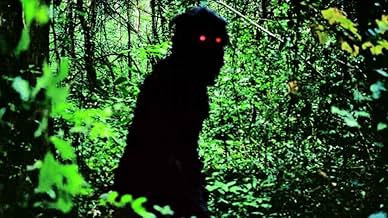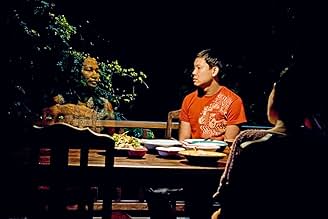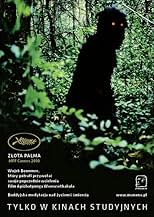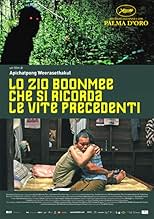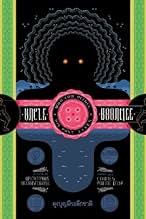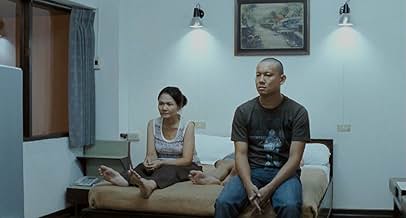CALIFICACIÓN DE IMDb
6.7/10
18 k
TU CALIFICACIÓN
Un hombre que se está muriendo de una enfermedad renal pasa sus últimos y sombríos días con su familia, incluido el fantasma de su esposa y un espíritu del bosque que antes fue su hijo, en u... Leer todoUn hombre que se está muriendo de una enfermedad renal pasa sus últimos y sombríos días con su familia, incluido el fantasma de su esposa y un espíritu del bosque que antes fue su hijo, en una granja del norte de Tailandia.Un hombre que se está muriendo de una enfermedad renal pasa sus últimos y sombríos días con su familia, incluido el fantasma de su esposa y un espíritu del bosque que antes fue su hijo, en una granja del norte de Tailandia.
- Premios
- 11 premios ganados y 25 nominaciones en total
Kanokporn Tongaram
- Roong
- (as Kanokporn Thongaram)
- …
- Dirección
- Guionistas
- Todo el elenco y el equipo
- Producción, taquilla y más en IMDbPro
Argumento
¿Sabías que…?
- TriviaShot on 16mm film rather than digital. Director Apichatpong Weerasethakul wanted to film in this format as the film is all about dying traditions.
- ErroresThe first time a ghost appears, during dinner, the nephew passes the ghost a glass of water. You can see the ghost image superimposed over the nephew's arm when he places the glass of water on the table.
- ConexionesFeatured in At the Movies: Cannes Film Festival 2010 (2010)
Opinión destacada
In order to appreciates the film, you have to understand that this movie is not just a normal film where you can expects classical narrative and plot. the directer not only have Buddhism as a philosophical point of view but he also put a little bit of Thai historical and political aspects in to the film.
In my opinion, the theme of this film is the man's struggle from human condition and transformation.
here are some few points I'd like to make concerning the film:
1. Man and Illusion
Before humankind, there was nature, which is pure and true. there are trees and wind and animals and so on. then there are man, which is basically another living specie. both animal and human have the same drive (sex, food, shelter etc.) the only different between man and animal is the ability to understand "sign" (read semiotic for more understanding) thus, human being created language, painting and symbol and so on. in other word, because our brain can perceived sign, so we can created ART. Art was created by man since the days of the cave man i.e. cave painting in Lascaux, France. (did you noticed that there are also cave paintings in the film?)
Man are proud that we are the only specie that can create and appreciate art, but what we didn't realized is that we are also the only specie that have the ability the created the illusion/lie/falsehood. Because of evolution, our unique brain can store memories and emotion, mix it up, and then created stuffs from it. because of this, the more time pass, the more we are far away from the truth; culture, law, politic, social status etc. are all MAN-MADE ILLUSION
2. Illusion of Dualism
It's seems like our perceived reality of "duality in nature" is embedded in our brain. we separated things into yin/yang mentality: day/night, good/bad, man/woman, live/death. one scene in particular shows how Boonmee kill the worms in his tamarind tree because "it's pest". then the next scene he show his sister the bee hive and seems very protective of it (he explain to his sister to avoid the larvae area on the plate). When he told his sister that his condition is the result of his karma from killing COMMUNIST and PEST, his sister replied "it's alright because you have good intention". When did killing other being can become good intention? Aren't communist human too? Aren't pests and bees are both insects?
3. The role of photography/Film, Memories, and Reality
Roland Barthes, in his book "Camera Lucinda", explained that a picture creates a falseness in the illusion of 'what is', where 'what was' would be a more accurate description. We can see a lot of scene involved photography; from the photos Boonmee shows to his dead wife as a proof of her funeral, the obsession of his son before he became a monkey, the final scene which Boonmee told the story about his dream etc. (this is an important scene, we will talk about it later)
4. In the playground, we created the rules, then we fought each other
In the film, we see peoples who of separated by this so-called man-made illusion, for example, different nationalities and spoken languages (Thai vs Laos), (Laos vs French) (Isan vs. Central Thai) etc. If you know little bit about Thai history, you will understand that the director also talk about the official vs the people / communism vs democracy(?).
in the final scene where Boonmee told the story about his dream, we see people wearing uniform. They are obviously appointed as "Soldier/Army". Then in the next photo we saw these soldiers captured the Monkeys Ghost. If you watch the film until this point, by now you should realized that the Monkey ghost is the allegory of the Communist.
then in the next photo, we saw that the soldier now taking their clothes off and play other kind of war game (throwing rock). The most funny thing is in the last photo, we saw 2 circles draw on the ground. In my opinion, the director suggest that countries, border dispute and war are nothing but a child's game.
5. Jāti: literally birth, but life is understood as starting at conception
the word "ชาติ" in Thai word derived from Sanskrit "Jāti", when translated to English it simply means "live". hence the name of the film "Uncle Boonmee who can recall his past lives" but in fact, the word Jati is the term in Buddhism which is not simply translate as "live" but have a lot more profound meaning.
By the way, I have the same feeling watching this film and Kubrick's 2001: Space Odyssey. Maybe because it also dealt with the theme of human condition and transformation, but this film is from the Eastern Philosophy point of view, of course.
In my opinion, the theme of this film is the man's struggle from human condition and transformation.
here are some few points I'd like to make concerning the film:
1. Man and Illusion
Before humankind, there was nature, which is pure and true. there are trees and wind and animals and so on. then there are man, which is basically another living specie. both animal and human have the same drive (sex, food, shelter etc.) the only different between man and animal is the ability to understand "sign" (read semiotic for more understanding) thus, human being created language, painting and symbol and so on. in other word, because our brain can perceived sign, so we can created ART. Art was created by man since the days of the cave man i.e. cave painting in Lascaux, France. (did you noticed that there are also cave paintings in the film?)
Man are proud that we are the only specie that can create and appreciate art, but what we didn't realized is that we are also the only specie that have the ability the created the illusion/lie/falsehood. Because of evolution, our unique brain can store memories and emotion, mix it up, and then created stuffs from it. because of this, the more time pass, the more we are far away from the truth; culture, law, politic, social status etc. are all MAN-MADE ILLUSION
2. Illusion of Dualism
It's seems like our perceived reality of "duality in nature" is embedded in our brain. we separated things into yin/yang mentality: day/night, good/bad, man/woman, live/death. one scene in particular shows how Boonmee kill the worms in his tamarind tree because "it's pest". then the next scene he show his sister the bee hive and seems very protective of it (he explain to his sister to avoid the larvae area on the plate). When he told his sister that his condition is the result of his karma from killing COMMUNIST and PEST, his sister replied "it's alright because you have good intention". When did killing other being can become good intention? Aren't communist human too? Aren't pests and bees are both insects?
3. The role of photography/Film, Memories, and Reality
Roland Barthes, in his book "Camera Lucinda", explained that a picture creates a falseness in the illusion of 'what is', where 'what was' would be a more accurate description. We can see a lot of scene involved photography; from the photos Boonmee shows to his dead wife as a proof of her funeral, the obsession of his son before he became a monkey, the final scene which Boonmee told the story about his dream etc. (this is an important scene, we will talk about it later)
4. In the playground, we created the rules, then we fought each other
In the film, we see peoples who of separated by this so-called man-made illusion, for example, different nationalities and spoken languages (Thai vs Laos), (Laos vs French) (Isan vs. Central Thai) etc. If you know little bit about Thai history, you will understand that the director also talk about the official vs the people / communism vs democracy(?).
in the final scene where Boonmee told the story about his dream, we see people wearing uniform. They are obviously appointed as "Soldier/Army". Then in the next photo we saw these soldiers captured the Monkeys Ghost. If you watch the film until this point, by now you should realized that the Monkey ghost is the allegory of the Communist.
then in the next photo, we saw that the soldier now taking their clothes off and play other kind of war game (throwing rock). The most funny thing is in the last photo, we saw 2 circles draw on the ground. In my opinion, the director suggest that countries, border dispute and war are nothing but a child's game.
5. Jāti: literally birth, but life is understood as starting at conception
the word "ชาติ" in Thai word derived from Sanskrit "Jāti", when translated to English it simply means "live". hence the name of the film "Uncle Boonmee who can recall his past lives" but in fact, the word Jati is the term in Buddhism which is not simply translate as "live" but have a lot more profound meaning.
By the way, I have the same feeling watching this film and Kubrick's 2001: Space Odyssey. Maybe because it also dealt with the theme of human condition and transformation, but this film is from the Eastern Philosophy point of view, of course.
- wasan_s2000
- 5 ene 2011
- Enlace permanente
Selecciones populares
Inicia sesión para calificar y agrega a la lista de videos para obtener recomendaciones personalizadas
- How long is Uncle Boonmee Who Can Recall His Past Lives?Con tecnología de Alexa
Detalles
- Fecha de lanzamiento
- Países de origen
- Sitios oficiales
- Idiomas
- También se conoce como
- Uncle Boonmee Who Can Recall His Past Lives
- Locaciones de filmación
- Productoras
- Ver más créditos de la compañía en IMDbPro
Taquilla
- Total en EE. UU. y Canadá
- USD 184,292
- Fin de semana de estreno en EE. UU. y Canadá
- USD 23,540
- 6 mar 2011
- Total a nivel mundial
- USD 1,214,424
- Tiempo de ejecución1 hora 54 minutos
- Color
- Mezcla de sonido
- Relación de aspecto
- 1.85 : 1
Contribuir a esta página
Sugiere una edición o agrega el contenido que falta

Principales brechas de datos
What is the Hindi language plot outline for Loong Boonmee raleuk chat (2010)?
Responda

